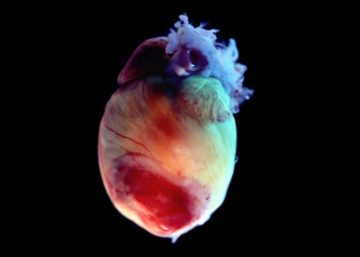Sara Reardon in Nature:
 Emotions such as fear and anxiety can make the heart beat faster. Now a study in mice has found that the reverse is also true — artificially increasing the heart rate can raise anxiety levels1. Links between emotions and physical sensations are familiar to everyone: hairs rising on the backs of your arms when you hear an eerie sound, or the sinking feeling in your gut when you receive bad news. But the question of whether emotions drive bodily functions or vice versa has long vexed researchers, because it is hard to control either factor independently.
Emotions such as fear and anxiety can make the heart beat faster. Now a study in mice has found that the reverse is also true — artificially increasing the heart rate can raise anxiety levels1. Links between emotions and physical sensations are familiar to everyone: hairs rising on the backs of your arms when you hear an eerie sound, or the sinking feeling in your gut when you receive bad news. But the question of whether emotions drive bodily functions or vice versa has long vexed researchers, because it is hard to control either factor independently.
“It was a chicken-and-egg question that has been the subject of debate for a century,” says Karl Deisseroth, a neuroscientist at Stanford University in California. He learned about this conundrum — first proposed by the psychologist William James in the 1880s — while at medical school and says the question has haunted him ever since.
Well-dressed mice
To test the phenomenon directly, Deisseroth and his colleagues turned to optogenetics, a method that involves using light to control cell activity. The team bioengineered mice to make muscle cells in the rodents’ hearts sensitive to light. The authors also designed tiny vests for the animals that emitted red light, which could pass through the rodents’ bodies all the way to their hearts. When a mouse’s vest emitted a pulse of light, the animal’s engineered heart muscles fired, causing the heart to beat.
More here.
